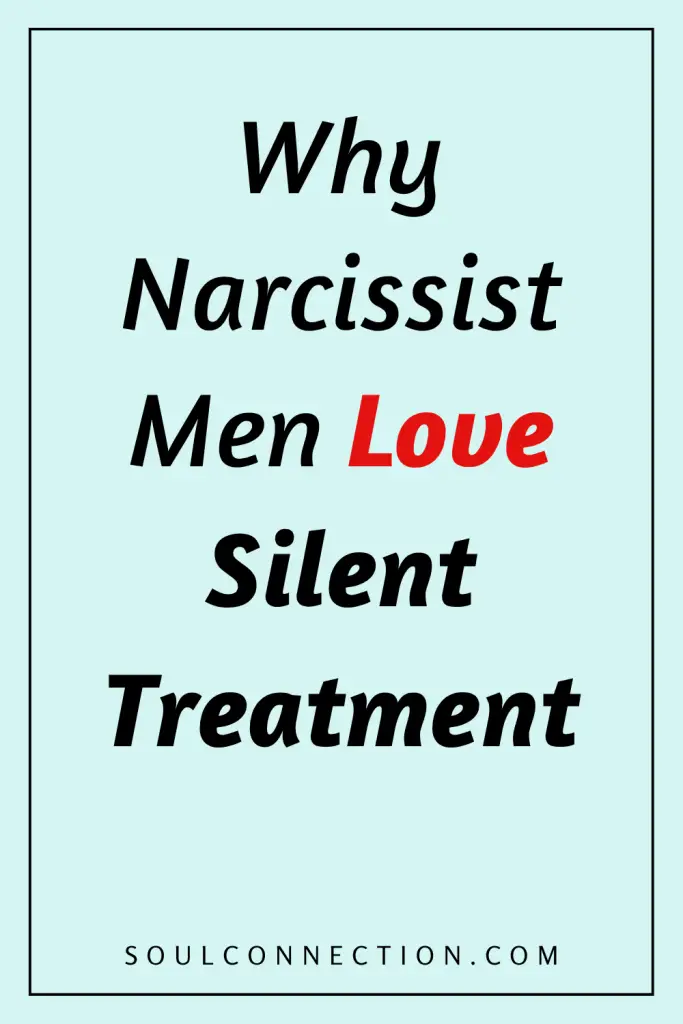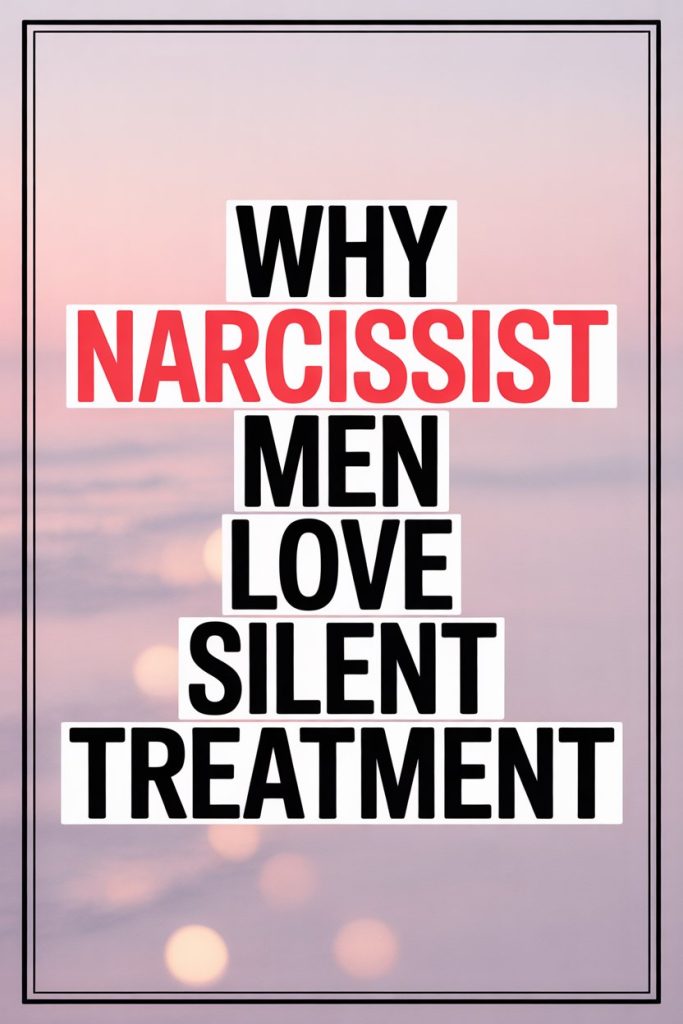Ever had an argument that ended not with yelling, but with eerie silence? That cold shoulder from a narcissist isn’t just a random mood swing; it’s a weapon—one that’s honed, polished, and deployed with frightening precision.
Let’s pull back the curtain on why narcissist men adore the silent treatment, how it keeps partners stuck in a cycle, and what you can do about it (without developing a permanent eye twitch).
Silent Treatment as a Power Play
The classic silent treatment: a favorite in the narcissist’s bag of tricks. This isn’t your average “I need a minute to cool off.” No, this is weaponized silence, designed to unsettle, control, and—let’s call a spade a spade—punish.
Narcissistic men love the silent treatment because it flips the script. Suddenly, it’s not about the original argument or their behavior. Now, the focus shifts to your growing discomfort.
You’re left wondering what you did wrong, replaying every sentence in your head like a broken record. Meanwhile, they’re the puppet master, yanking the strings and relishing the confusion.
Control Without Saying a Word
You’d think control requires shouting, right? Not when you’re dealing with a narcissist. Silence lets them dictate the emotional climate without looking overtly aggressive.
There’s plausible deniability—“I’m just not ready to talk”—all while you’re sweating bullets, desperate for resolution.
This approach is sneaky. Partners often second-guess themselves, tiptoe around, and try to fix what’s “broken,” which only tightens the narcissist’s grip.
And the worst part? It’s all happening without a single shout.
Feeding the Ego
What’s more delicious to a narcissist than watching someone twist themselves in knots? The silent treatment creates a scenario where you chase them, apologize for things you didn’t do, and practically beg for scraps of attention.
The narcissist’s self-image soars. After all, if you’re groveling, they must be pretty important, right?
Every anxious glance, every text asking, “Are you okay?”—that’s fuel for their ego. It’s a one-way buffet, and guess who’s starving?
Avoiding Accountability
Accountability? A narcissist’s least favorite word (although, to be fair, “empathy” is a close second). Silent treatment works wonders for dodging responsibility.
If you don’t talk, you can’t be held to account for your words or actions.
Instead of discussing the issue, reflecting, or apologizing, the narcissist withdraws into silence. You’re left staring at your phone, wondering why you’re being iced out. It’s emotional outsourcing at its finest.
Making You Doubt Yourself
Silence, especially in the hands of a narcissist, is a mind game. You start wondering: Did I overreact? Was I too sensitive? Did I push him too hard?
Gradually, you might stop bringing up concerns, avoid expressing needs, or start apologizing for having feelings at all.
The narcissist’s silence becomes a mirror, reflecting your insecurities and making you question your own sanity. “Maybe it really is me.” Spoiler alert—it isn’t.
Creating Drama (But Blaming You for It)
Ironically, silent treatment ramps up drama under the guise of “keeping the peace.” You sense something’s wrong, but can’t put your finger on it. Tension builds.
You might finally snap, demanding answers—then suddenly, you’re “too emotional” or “always starting arguments.”
Narcissists love this dynamic. They get to watch the show, claim innocence, and pin the blame for any outburst right back on you. It’s reality TV, minus the cameras.
Delaying or Denying Conflict Resolution
Healthy conflict? That’s a foreign concept here. Silent treatment stalls any possibility of working things out. Issues fester, resentment grows, and communication breaks down.
Narcissists aren’t interested in resolution—they’re interested in winning. Silence ensures the scoreboard stays tilted in their favor, while you’re left playing a game with no rules (and, apparently, no sound).
Training You Not to Rock the Boat
The more often a narcissist uses silent treatment, the more you start picking your battles. You learn what topics are off-limits. You avoid expressing certain emotions, skip certain stories, and practically tiptoe across eggshells.
Over time, this reshapes your behavior. You become smaller, quieter, more “low-maintenance.” Meanwhile, the narcissist enjoys a relationship that’s tailor-made to avoid their discomfort. Neat trick, isn’t it?
Setting the Stage for “Hoovering”
After a lengthy silent treatment, many narcissists turn on the charm. Suddenly, they’re texting, calling, or acting as if nothing happened. This is “hoovering”—sucking you back in with kindness, affection, or grand apologies.
You’re so relieved the silence is over that you welcome them back, grateful for the crumbs of attention. Rinse and repeat—the cycle continues. The message: speak up, and you risk being shut out again.
Why Silent Treatment Hurts More Than Yelling
People often underestimate the damage done by silence. It’s not “just ignoring”—it’s emotional withdrawal, abandonment, and rejection rolled into one.
This triggers deep-seated fears, especially for those with abandonment issues or trauma histories.
The pain isn’t loud, but it’s fierce. Partners describe feeling invisible, unworthy, and alone—sometimes questioning their entire reality. Silent treatment can leave wounds louder than any shouted insult.
Spotting Silent Treatment for What It Is
Not every instance of silence is narcissistic abuse. Sometimes people need space, and healthy relationships allow for cool-off periods. The difference: intent and frequency.
Is silence used to punish, manipulate, or control? Is there a pattern of withdrawal after conflict, followed by no accountability? If so, you’re probably dealing with more than just a quiet moment.
How to Respond Without Losing Yourself
Here’s where it gets tricky. Responding to silent treatment with more pleading or apologizing just reinforces the narcissist’s control.
Chasing after someone who’s ignoring you rarely ends well—it just deepens the power imbalance.
Instead, acknowledge your feelings and set boundaries. You might say, “I notice you’re not speaking to me. I’m open to talking when you’re ready, but I won’t beg for communication.”
This sends the message that you value yourself enough to not grovel for attention.
Keep your dignity. Resist the urge to send 27 texts. Go for a walk, talk to a friend, or enjoy something just for you. Self-respect is contagious—sometimes even narcissists notice.
When Silence Isn’t Golden
Chronic silent treatment takes a heavy toll. Over time, your confidence, emotional security, and even physical health can decline. It’s not “just a phase”—it’s emotional abuse.
If you’re stuck in this cycle, consider reaching out for support. Talk to a therapist, join a support group, or confide in someone you trust. You deserve connection, conversation, and care—not mind games and cold shoulders.
Reclaiming Your Voice
Narcissists bank on your silence, self-doubt, and desperation. Shaking off the effects of their silent treatment starts with recognizing what’s happening—and remembering that you are not the problem.
Communication should never feel like a punishment. Relationships thrive on openness, not icy stares across the dinner table.
It’s possible to reclaim your voice, set boundaries, and insist on mutual respect—even if that means walking away from someone who refuses to listen.
The next time you’re hit with the silent treatment, try treating yourself to something better: the sound of your own voice, your own needs, and your own worth, loud and clear.


